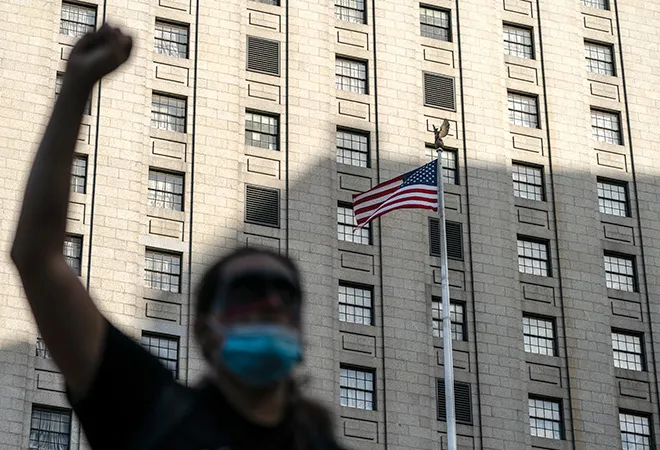-
CENTRES
Progammes & Centres
Location

The American uprising in the public square after the killing of George Floyd, an African American in Minneapolis, has sparked a dramatic shift in the country’s public opinion on race and policing. Floyd died in late May after a police officer pressed his knee into Floyd’s neck for 8 minutes and 46 seconds. Bystander videos of the murder sparked nationwide protests that are still raging. This moment feels different, the demographics of this protest movement speak to a multiracial coalition rarely seen before. Poll after poll is finding that more Americans today think the country is out of control and systemic racism is shorthand for an awful set of life outcomes for non-whites. Few have immersed themselves in these questions like Professor Eddie Glaude Jr, chair of the department of African American Studies at Princeton University. Glaude, Jr. joined us over a video call to discuss how America came to speak in a common tongue on race in the middle of a pandemic. Glaude agrees that, yes, this moment is powerful but says it is no guarantee that we’re going to come out at the end of this with a more just set of social and economic arrangements. “It’s a hope not hopeless but unhopeful”, he said. Below are excerpts from the interview.
Glaude: “We are at an inflection point in this country, and it has everything to do with the contradictions that are in full view — of a political and economic ideology that has governed the country for the last 40-60 years. So in some ways, what we're experiencing here in the US is the collapse of Reaganism that involves some kind of assumptions that led to this extraordinary gap between the rich and the poor in this country. So that kind of vulnerability and precarity has been exposed. At the same time, it's overlaid by the ongoing contradiction at the heart of the American experiment that has everything to do with white supremacy. It is the serpent wrapped around the legs of the table upon which the Constitution and Declaration of Independence were signed. Over the last 50 years, we have seen politicians appeal to white fears. We have seen those fears and those resentments result in a policy of being tough on crime that have led to aggressive policing and incarceration of black folks and brown folks at alarming levels. You also have organisers working on the ground and out of view since 2014 and before. So this is this is in some ways the result of an extraordinary organising effort as well. Contradictions and organising, they go hand in hand.”
Glaude: “I don't know, there's no guarantee that it will result in fundamental change. While we can see forces trying to maintain the overarching frame of policing in the country. But I think we’re going to see the continued pressing by these various coalitions for the country to fundamentally change. I think we have a generation that has come to the conclusion that America is broken. The performance of autocratic and authoritarian power by Donald Trump only exacerbates and deepens the conclusion that American democracy fundamentally broken. But there is no guarantee that we’re going to come out at the end of this with a more just set of social and economic arrangements. Our task is to tell the truth about what we've done and what we continue to do. To bear witness to the suffering as James Baldwin would have said, to make the suffering real. We don’t need charity or philanthropy. We don't need white America to give us anything. What we need more than anything is for folks to tell the truth, and to repair, and in doing both, we could get to a more just world.”
Glaude: “It’s a haunting echo. Why it was the spark that lit the tinderbox — that’s a question that historians and sociologists will have to ask. We never know what triggers these historical moments but the juxtaposition of that lynching with the theatre of authoritarian power at Lafayette has raised the question: Have we lost ourselves? Have we lost the illusion of who we take ourselves to be? And you saw the backlash from the military, you saw the backlash from certain parts of the Republican party with regards to Lafayette Park. And, you know, the way the police responded to the protesters with tear gas — that’s the way they police our communities every day! It's just aggression, contempt, insult, spite. So, people will clutch their pearls and ask, ‘Oh my god is this America?’. It seems to me that we’re at an inflection point. Again, I don't know where we will end up. Let’s put it this way, one of my favourite quotations — “it’s a hope not hopeless but unhopeful””.
The views expressed above belong to the author(s). ORF research and analyses now available on Telegram! Click here to access our curated content — blogs, longforms and interviews.

Nikhila Natarajan is Senior Programme Manager for Media and Digital Content with ORF America. Her work focuses on the future of jobs current research in ...
Read More +